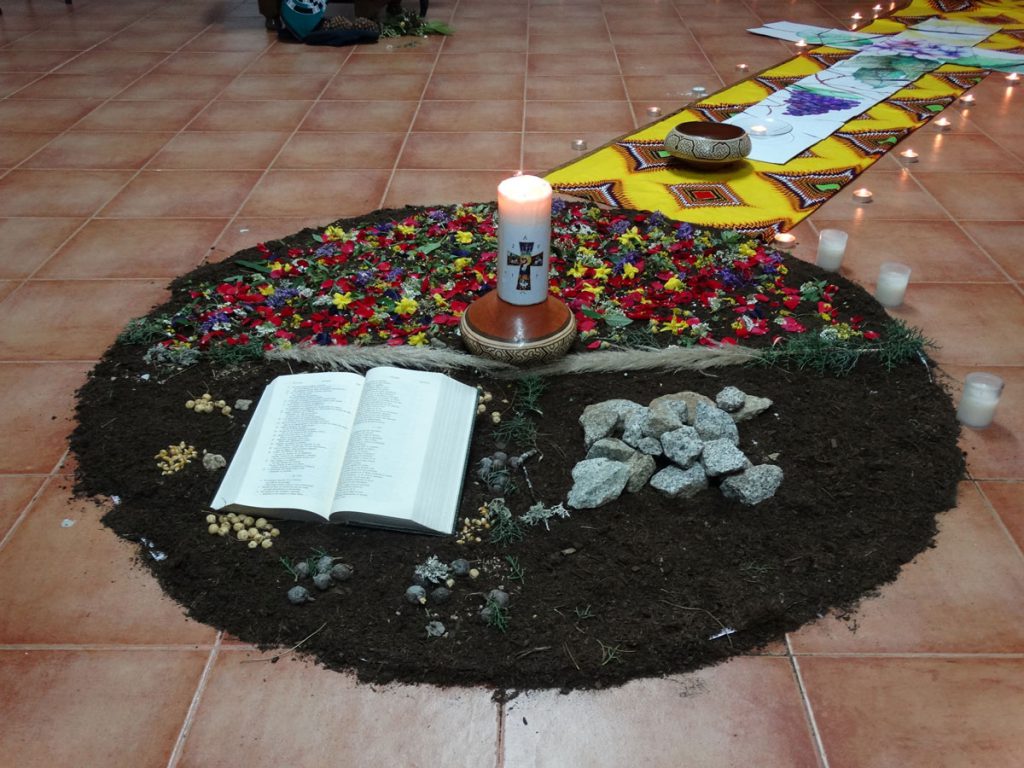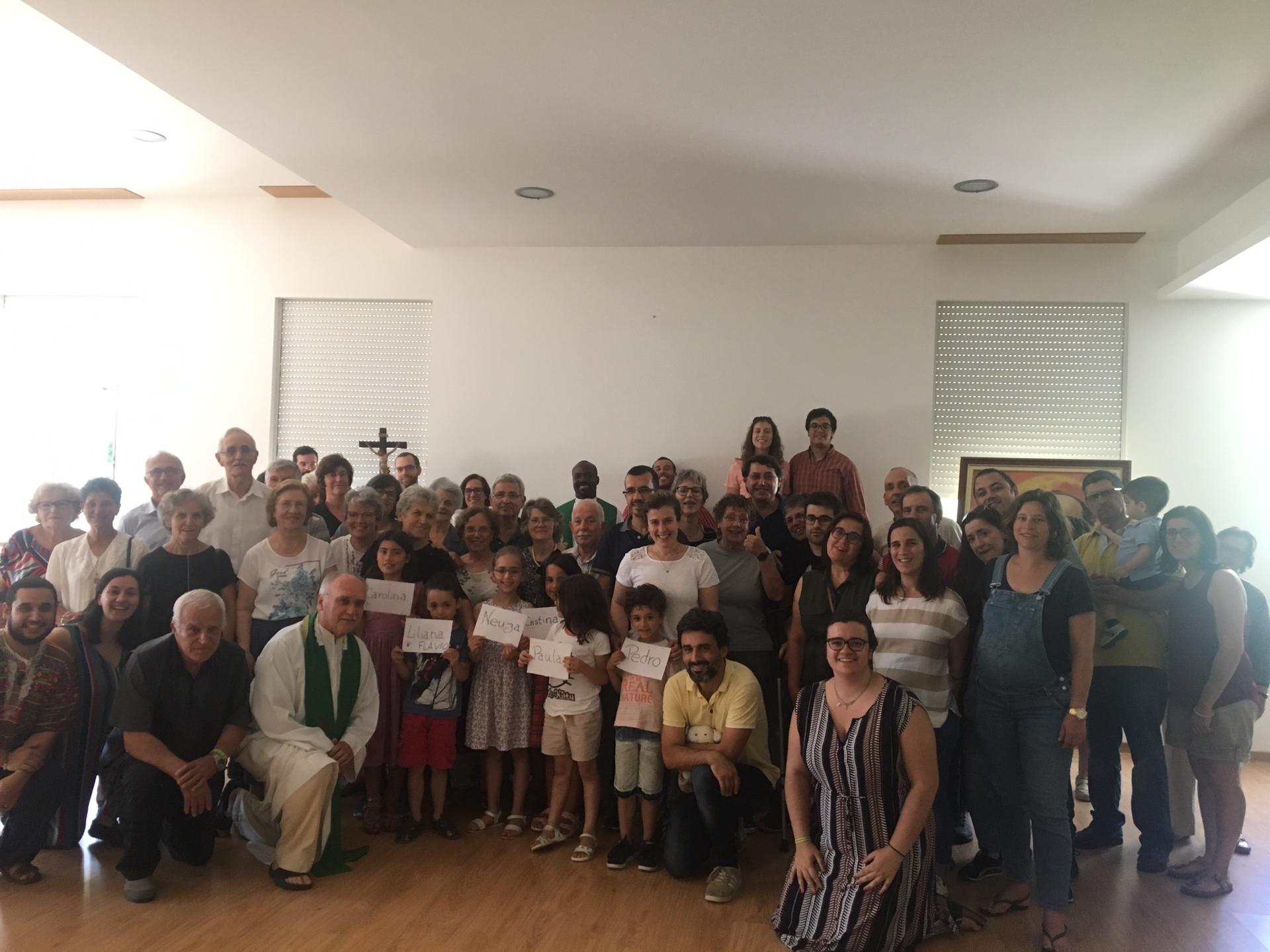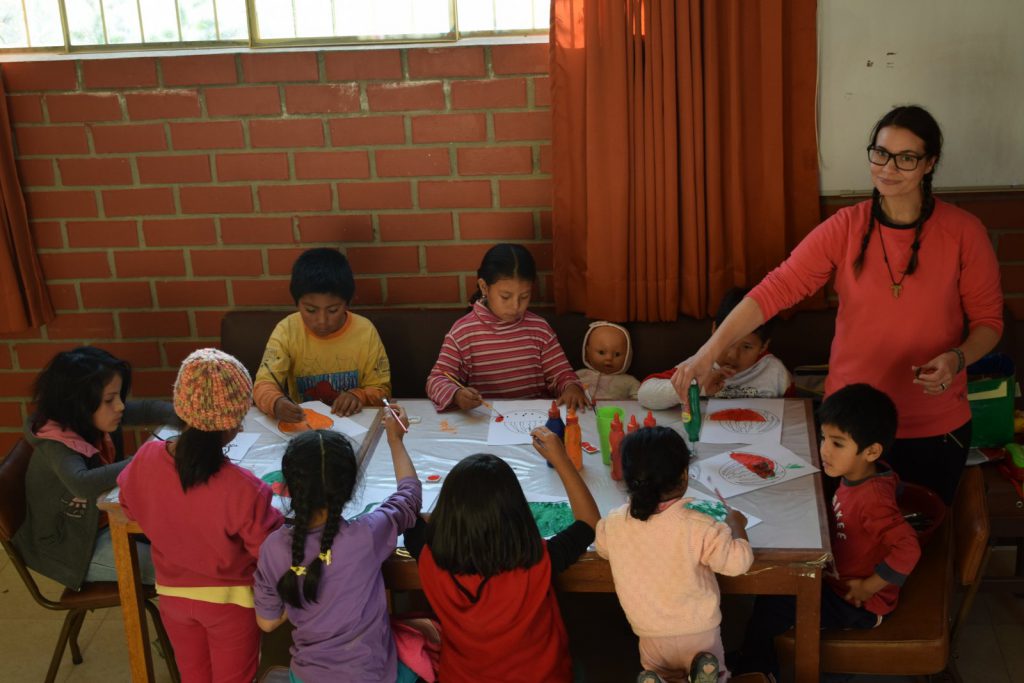
August – That families, through their life of prayer and love, become ever more clearly “schools of true human growth”. Lord hear us.
The formation meeting of the CLM took place in Viseu (Portugal) on July 12-14.
As another year comes to an end, it is necessary to have an adequate evaluation of the progress made by the participants, so we did not follow any specific formation theme.
The candidates began to arrive in the afternoon of the 12th. Every meeting is always a great joy! The latest news bits are exchanged in between smiles and hugs! We all feel welcome in this mission house that always receives us so well!
As usual, on Saturday we started the day with the celebration of the Eucharist in the large chapel, open to the entire local community.
After breakfast, we moved to the upstairs hall where we exposed the Blessed Sacrament. This way, in front of the Lord, it was possible to pray and reflect over the progress made during the past year of formation. Many questions come up and it is necessary to find answers, my answers to ach one! Analyzing the past and taking advantage of the present by questioning ourselves before the Lord of Mission, we find answers and take decisions for the future. A future we want to live with Him, wherever and with whomever he will wish!
Renewed and strengthened by the Holy Spirit, we met individually with the Coordinating Team. Thus the day went by, the great day of evaluation, which we all hoped it would be positive.
Several Comboni Lay Missionaries with mission experience, some with their children, joined us for the afternoon prayer. How beautiful to see the children at this prayer! Above all, we prayed for the CLM members who are in mission lands ad gentes. That they never run out of protection and hope! How strong is this desire to be united in prayer! In Jesus, who sends us, and in the Holy Spirit, who accompanies us, we believe that we have nothing to fear!
On Sunday, after morning prayer and breakfast, our relatives began to arrive to spend this day with us in an atmosphere of celebration and sharing. After the welcome by Fr. Francisco Medeiros, they all introduced themselves and the CLM Vânia gave an account of all that the CLM have done during the year, highlighting the news we received from Augusta and Cristina in the Central African Republic, Paula and Neuza in Peru, Liliana and her husband Flávio in Brazil, Marisa in Mozambique and Pedro and Carolina in Ethiopia. With great emotions on the part of their relatives, we saw pictures and videos of these members, showing very explicitly what it means to be missionaries with the poor and disadvantaged.
Immediately after that, we listened to the witness of María Augusta who recently returned from the Republic of Central Africa. Simply and with empathy, she spoke of the latest events, adventures and misadventures.
The Eucharist followed, a strong moment of the day, sharing the Word and the Bread, together with our faith and the Comboni charism that unite us all.
After lunch, where the tables were loaded an nothing was missing, the gathering continued in the afternoon. With games, jokes, songs, stories and so on, we had a fabulous time in the Portuguese fashion.
Many thanks to all, especially to the formators and the coordinating team, who followed us for yet another year.

Glória Rocha
In June our meeting was not the usual formation meeting of Viseu, but rather a gathering of the Comboni family in Maia, which happens there annually and is prepared and organized by the Comboni Family Commission. This year we gathered on June 28-30 over the theme, “Let your heart be mission,” as this year’s topic for the Comboni Family.
It was a very beautiful meeting! First of all, only a small but diverse group attended, greatly enriching the perspectives and the sharing of the topics. Secondly, it was a gathering rich in reflection themes, but in a spirit of sharing as a Comboni family strengthening our ties of communion and friendship.
On Saturday morning, after morning prayers, Bishop António Couto of Lamego spoke on “The heart in the Bible.” We delved deeply in the biblical meaning of the heart and its significance. Then we saw what it means “to be mission” and Dom António shared some perspectives on how to be mission and do missionary work today and in today’s circumstances, giving concrete examples of groups and people who perform fruitful missionary work today.
Then the participants shared in the formative theme given by the bishop of Lamego, answering some questions he gave us.
In the afternoon, Comboni Sr. Arlete spoke to us. She spoke of the life of St. Daniel Comboni, his “passionate heart” for Africa, his “cordiality,” namely, how his heart moved for “all and how he kept everyone in his heart,” and his devotion to the Sacred Heart.
Later we shared again in groups what we had heard, trying to reflect together on how to live today, and in the same circumstances, this same passion and enthusiasm of Comboni.
At the end of the day, we celebrated Mass and then we had a sardinada where we could converse, socialize and strengthen our friendships. It was a beautiful and agreeable time!
On Sunday, after morning prayers, we gathered to share what we had reflected upon in groups the previous day. From here came new reflections as we continued to share and it was a time of joint meditation and mutual enrichment.
We ended with the Eucharist. Then we entrusted to the Lord all the life decisions we could take during this gathering, together with our missionary enthusiasm regenerated and strengthened at this meeting.
In this meeting, praying and sharing together, we animated one another as Comboni family to be mission, to be enthused by the proclamation and the witness, and to do so “immediately” with vigor and perseverance, in all circumstances!
Filipe Oliveira
Perhaps our idea of mission and of the world is a little rosy, but for me mission is a rainbow of colors, emotions, instants and learning. Mission is more than the vast blue sky I embrace every day at the beginning and at the end of it, it is more than the brown color of the desert’s sand that covers the ground. It is also more than the green of the scenery where some trees fight to stay green, or the grey of foggy days hiding the volcanos. Mission is an immensity of colors. It is the color of the faces that make me smile and the color of the stories I listen to hour after hour reminding me about what we are made of, and it is the color of all those hearts that teach me how it is possible to love more. But it is also the color of the smiles, the hugs, the tears and the color of the natural and human scenery. The daily mission to stick with them has a lot of colors.
They are the children who call to me in the streets or in the kindergarten, where I joyfully share my returning to being a child with them, giving myself without fear. They are the elderly who freely dance when they come to visit since, allow me to say it, for them we are often the only family they have. There are real stories of survival and struggle. Or the families when we gather to share it all, which is the sum of individual parts because it through this occasion that we meet and donate of ourselves without preconceptions or conditions, simply because that’s the way it is. It is also in the daily visits where I find the true meaning of my walking around and where I see the colors of the world here and now. Here in this little burg I daily live the experience of being me, with the essence of all the colors I feel inside and of those I allow myself to see in the world.
I confess to you that often I allow myself to be molded by them, by their experience of life and of God, that I allow myself to observe and where I have many teachers. So, I allow myself to get out of myself in order to learn from them. I always believed that they did not call me for nothing else but to love. To love these people, this culture and these customs. To love in all its aspects, in the falls in the errors, in the getting up and with the hope of being a better version of myself every single day. And even though over a year has gone by, I keep on learning from them – we learn together. Thus, each day I discover another color both inside and outside me, in this interchange of life, histories and faces where every day I discover the color of love.

PS. Love is not of one color. Love will also have the color you choose!
With love and gratitude,
Neuza Francisco, CLM
On the weekend of May 18-19, the CLM formation group gathered for its monthly meeting with the following theme: “Mission today: How? Why? For what? The Church in action.”
Even though the number was lower than usual, the gathering was quite rich in content. We started with the great question: Why mission? The various answers arrived to the same conclusion that it is the love of Jesus that moves us to go further out. And to help us remember that Jesus was the first missionary, the theme continued with the passage of the Road to Emmaus where the disheartened disciples recognize Jesus like the “One” who set their hearts on fire with his words.
Besides Bible passages we also reflected parts of the Encyclical Redemptoris Missio of Pope St. John Paul II over the enduring value of the Missionary Mandate, reflecting the key words about the meaning of Mission and of being a Missionary. In this encyclical, Pope St. JPII invites the Church to renew its missionary commitment, stating that “Mission is a problem of faith, the correct measure of our faith in Christ and in his love for us.”
On Saturday after lunch, we visited the house of the Comboni Sisters, who shared with us some of their experiences, and witnesses of missionary life.
After this time, we returned to our theme and moved on to the reading of the Pastoral Note of the Portuguese Episcopal Conference on the Mission Year and the Extraordinary Mission Month, inviting all Christians to live a year of constant encounter with Jesus. To be in a permanent state of mission, to live the mission and mission renewal.
That evening we saw the film “Francis and Clare,” a show that made us reflect on their lives embattled for the love of Jesus and their dedication to the emarginated.
The Sunday started with a beautiful dedication to our Mother, Mary Queen of Missions, by starting our first prayer of the day in front of an image of her outside the house. After breakfast and up to the Eucharist, we studied excerpts from the Apostolic Exhortation Evangelii Gaudium and we contacted by a video call Pedro Nascimiento and Carolina Fiúza who shared their experiences from their arrival in Ethiopia. Then we ended this very fruitful meeting with the Eucharist and the certainty that we were leaving with the joy of Jesus who made us and wnts us to be missionaries, every day and everywhere.

Mónica Silva